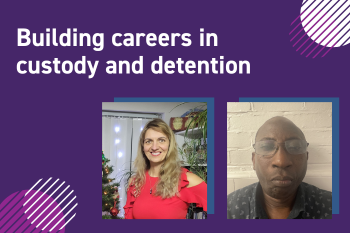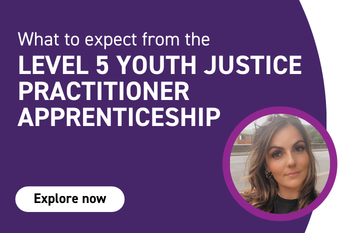The work of youth justice practitioners is crucial in the justice system. Also known as intervention workers, youth offending service officers, or reparation officers, people in these roles work with young people who have been involved in criminal activities or are at risk of offending.
Jump to:
- Where this occupation is found
- The day-to-day role
- The skills and personality traits required
- How to become a youth justice practitioner
- Resource and support
Where this occupation is found
Youth justice practitioners work in a variety of settings, each playing a critical role in the youth justice system:
- Youth justice teams – Youth justice teams are part of the local council and are separate from the police and courts. They work closely with the police, probation officers, courts staff, health, housing and children’s services, schools and education authorities, and charities and the local community.
- Secure facilities – Youth justice practitioners work in secure children’s homes (SCH), secure training centres (STC), and young offender institutions (YOIs).
- Community settings – Many youth justice practitioners work in community-based roles, providing outreach services, support, and supervision to young offenders who are serving community services or are on release from custody.
- Schools and education – Some practitioners work within schools or collaborate with education authorities to support young people, address behavioural issues, and reduce the risk of offending.
- Voluntary organisations – Various not-for-profit organisations and charities focus on youth justice, offering support, rehabilitation programmes, and advocacy for young offenders. Practitioners in these settings often work on specialised projects or interventions.
The day-to-day role
In their daily role, youth justice practitioners interact with children, up to the age of 18, who are involved in offending or anti-social behaviour. They work with some of the most disadvantaged children in society who often have complex needs.
Safeguarding is central to their work, ensuring the safety and well-being of each child is prioritised at all times. Starting with a thorough assessment of the young person’s situation, the youth justice practitioner aims to understand the individual’s background, needs, and risks, creating a personalised intervention plan.
An important part of the role is also to work closely with the children’s families to create a supportive home environment and address any underlying issues that may contribute to the offending behaviour. Youth justice practitioners also work closely with multi-agency teams, including police, social services, and educational institutions to deliver coordinated support to the young person. Advocacy is also a key part of their job, representing the young person’s interest in court and other settings, ensuring they receive the appropriate interventions and support.
Through all their day-to-day work, youth justice practitioners aim to rehabilitate young offenders, promote their reintegration into society, and enhance public safety. A key aspect of their role involves preventative justice, intervening early to address underlying issues and prevent these young individuals from entering or re-entering the criminal justice system. By focusing on tailored interventions and support, they work to break the cycle of offending and guide young people towards a more positive future.
The skills and personality traits required
A role in youth justice is for you if:
- You are passionate about helping young people, acting both as a mentor and a figure of authority.
- You can understand and connect with children and young people from all backgrounds and situations, including those who have committed serious crimes, grown up in difficult settings, or have mental health concerns.
There are many skills and personality traits that can complement the role of a youth justice practitioner, such as:
- Communication skills – You need to be able to understand the needs and concerns of the young people you support, making communication skills essential.
- Interpersonal skills – Both empathy and negotiation are important interpersonal skills which a youth justice practitioner needs in order to fulfil the role. Managing conflicts and encouraging cooperation between the young person, their family, and other agencies.
- Knowledge of the legal and social systems – Part of the role is to become familiar with the legal frameworks and procedures affecting young offenders. In an apprenticeship, this knowledge is developed on the job through training.
- Resilience – In youth justice, it’s important to have an ability to cope with setbacks and challenging cases, while maintaining motivation and a positive outlook.
- Commitment to positive change – Those who are driven by a belief in their potential for positive change will do well in youth justice.
How to become a youth justice practitioner
Approved for delivery since 2021, the Level 5 Youth Justice Practitioner apprenticeship standard offers a formal route into youth justice roles. The apprenticeship typically takes 25 months to complete (not including the End-Point Assessment (EPA) which typically lasts for 4 months). There is a requirement that some experience working with young people, and sometimes adults in challenging situations, is necessary to have before starting this apprenticeship and candidates are expected to have a strong commitment to equal opportunities and diversity.
Apprentices will develop many skills during this apprenticeship, including:
- Communicating effectively face-to-face and in writing with children who encounter the youth justice system.
- Identifying the factors that may lead to offending and anti-social behaviour, and the methods for promoting desistence, and use these to plan and individually tailor interventions.
- Promoting the physical, emotional, and mental health and wellbeing of children in the youth justice system by recognising and building on strengths, identifying need, and taking action to protect children where necessary.
Access the full list of skills that will be developed through this apprenticeship route.
Resources and support
Explore these helpful resources if you’re interested in pursuing a career as a youth justice practitioner:
- SFJ Awards – SFJ Awards are the End-Point Assessment Organisation (EPAO) for the Youth Justice Practitioner apprenticeship standard. We provide information about the EPA process and how to prepare for it.
- HM Prison and Probation Service – HMPPS provide an overview of the role, skills you’ll need and information on how to become a youth justice worker.
- Gov.uk – The government website provides information on all apprenticeship standards in England. They have a helpful page of information about the Youth Justice Practitioner standard.
- IfATE – The IfATE website has information on all the apprenticeship standards in the country. You can use this to explore more detailed information on the Youth Justice Practitioner apprenticeship standard.
Find out more about this apprenticeship and which training providers offer this course →





